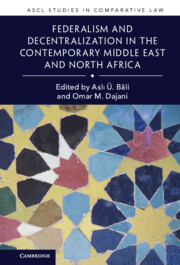Book contents
- Federalism and Decentralization in the Contemporary Middle East and North Africa
- ASCL Studies in Comparative Law
- Federalism and Decentralization in the Contemporary Middle East and North Africa
- Copyright page
- Contents
- Contributors
- Acknowledgments
- 1 Introduction
- Part I Theoretical and Comparative Context
- 2 Decentralization to Manage Identity Conflicts
- 3 Devolution and the Promotion (or Evasion) of Minority Rights
- 4 Constitutional Design Options for Territorial Cleavages in the Middle East
- 5 How Decentralization Efforts Have Recentralized Authority in the Arab Region
- Part II Decentralization and Governance Reform
- Part III Decentralization and Self-determination
- Part IV Decentralization, Conflict, and State Fragmentation
- Part V Conclusions
- Index
2 - Decentralization to Manage Identity Conflicts
from Part I - Theoretical and Comparative Context
Published online by Cambridge University Press: 15 January 2023
- Federalism and Decentralization in the Contemporary Middle East and North Africa
- ASCL Studies in Comparative Law
- Federalism and Decentralization in the Contemporary Middle East and North Africa
- Copyright page
- Contents
- Contributors
- Acknowledgments
- 1 Introduction
- Part I Theoretical and Comparative Context
- 2 Decentralization to Manage Identity Conflicts
- 3 Devolution and the Promotion (or Evasion) of Minority Rights
- 4 Constitutional Design Options for Territorial Cleavages in the Middle East
- 5 How Decentralization Efforts Have Recentralized Authority in the Arab Region
- Part II Decentralization and Governance Reform
- Part III Decentralization and Self-determination
- Part IV Decentralization, Conflict, and State Fragmentation
- Part V Conclusions
- Index
Summary
States in the Middle East and North Africa (MENA) region since independence have had limited experience with stable constitutional arrangements for decentralization of decision-making to regional or communal governments. Experiments from non-MENA countries provide models that might be borrowed to help hold together MENA’s culturally plural societies. These other countries have experimented with nonterritorial, homeland, subdivided homeland, and multiethnic jurisdictions. These constitutional arrangements vary in the powers they allocated to the subnational jurisdictions to select local leadership and make cultural and economic policies. The constitutional arrangements also vary in the guarantees against central intervention in the internal affairs of the sub-national jurisdictions. To make these arrangements more stable, these experiments have tried various provisions for limiting unilateral constitutional amendment, sharing rule in the central government, balancing different types of jurisdictions against one another, and subordinating the constitutional order to international guarantors.
- Type
- Chapter
- Information
- Publisher: Cambridge University PressPrint publication year: 2023



